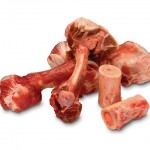Cooking at temperatures above 118F destroys the naturally occurring enzymes in food. This means your dog’s body has to produce all of the enzymes necessary to digest the food and sooner or later, this limited supply will be used up.
Enzymes are responsible for every metabolic reaction that takes place in your body, whether it is the blinking of your eye or the functioning of your liver. Of course, the same applies to your dog’s body.
What Are Digestive Enzymes?
The body also uses enzymes to digest and use food. There are two types of enzymes that do that: enzymes in the food itself, and enzymes that reside in the digestive organs. The body can’t produce a finite supply of enzymes – like a bank account, if you continuously make withdrawals without depositing money, you will soon be broke.
This is what happens when dogs eat processed pet foods. Cooking at temperatures above 118 o F destroys the naturally occurring enzymes in food. This means your dog’s body has to produce all of the enzymes necessary to digest the food and sooner or later, this limited supply will be used up. If the body is constantly producing enzymes for digestion, it can’t produce the enzymes needed for maintaining healthy tissue and cleaning up toxins in the body. This places strain on the pancreas as it must be constantly producing digestive enzymes instead of its normal work as part of the immune system. This strain leads to ill health, chronic disease such as diabetes, arthritis and allergies, and a shortened lifespan.
Enzymes are life and when your dog is out of enzymes, he is out of life.
Enzymes In The Diet
The best solution for enzyme deficiency is to feed your dog foods that already have an abundance of enzymes. Whereas processed foods are ‘dead’, raw and whole foods have an abundance of enzymes. In order to function optimally, enzymes work in close association with vitamins and minerals. Vitamins and minerals will also be found in abundance in raw foods.
There are many foods that are high in naturally occurring enzymes. One of the best sources is raw, green tripe – it carries a host of digestive enzymes! Feeding whole prey animals, with the digestive system and organs intact, will also accomplish this. Fresh muscle meat is also a good source of enzymes.
Enzymes are used up faster during some illnesses, extremes in weather or strenuous exercise. Older dogs will also benefit from extra enzymes as the amount of enzymes produced in the body declines with age and this is partly responsible for age related illness and debilitation. If a dog has spent most of his own enzymes and he isn’t getting any in the diet, his cellular function and health will rapidly decline.
Supplementing With Enzymes
Even raw fed dogs might not be getting enough enzymes in their diet, especially if they don’t consume the entrails of their food (and most dogs don’t). Supplementing with digestive enzymes may be a smart idea for many dogs. When shopping for a digestive enzyme, try to find one that’s produced from animals, not plants.
Dogs who are getting enough digestive enzymes have better immune health, skin, coat, joints and teeth, and will do a better job of getting all of the nutrients out of their food. But remember, when they’re gone, they’re gone – so now is a great time to make sure your dog is getting enough enzymes in his diet! I highly recommend you buy high quality animal based enzymes from the Mercola website here. This product is also great for older dogs whos immune system may be compromised.











